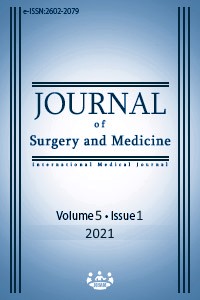Judet's quadricepsplasty after total hip arthroplasty and Thompson's quadricepsplasty: A case report
Keywords:
contracture, hip joint, hip prosthesis, knee jointAbstract
Judet quadricepsplasty provides a gradual release of knee extension contracture occurring due to intrinsic and extrinsic reasons. We herein present a 68-year-old male patient with a fragmented right femur AO (arbeitsgemeinschaft für osteosynthesefragen) Type A3 fracture, which occurred because of an in-vehicle traffic accident 30 years ago. The fracture was fixed with an anterior plate-screw with open reduction, and knee extension contracture had developed after the operation. The distinctive features of this case include a previous, unsuccessful, ipsilateral V-Y quadricepsplasty, an ipsilateral total hip arthroplasty with anterior approach six months ago and a persistent extension contracture for over 30 years. Gradual releasing techniques, as described by Judet, were performed under general anesthesia and sterile conditions with the patient in supine position. Intraoperatively, two displaced screws were detected on the anterior femur, which had adhered to the vastus medialis muscle, and fibrosed. Adhesions were dissected and screws were removed. Before the release of the proximal adhesion of the rectus muscle, a forced external rotation of hip joint was performed to assure that adequate fibrotic tissue had formed on the anterior facet of the joint capsule to prevent anterior instability. Five recurrent knee joint effusions developed after surgery, which were aspirated by needle. Joint fluids were clear and there were no reproductions of any microorganisms. By the end of an uneventful, two-year follow-up period, final knee range of motion was 0-90 degrees. Loss of extension and extensor muscle power had entirely improved by 6 months. In a patient with hip prosthesis, provided that adequate fibrosis has formed on the anterior facet of the joint capsule, rectus release may not cause instability. In cases resistant to rehabilitation, if there is implant, fibrosis or hypertrophic callus which may cause irritation at any level of the knee extensor mechanism, we suggest their resection for a more even anterior cortex contour.
Downloads
References
Judet R. Mobilization of the stiff knee. J Bone Joint Surg Br. 1959;41(B):856–7.
Nicoll EA. Quadricepsplasty. J Bone Joint Surg Br. 1963;45:483–90.
Bari MM, Islam S, Shetu NH, Rahman W, Rahman M, Munshi MH et al. Judet’s Quadricepsplasty for Extension Contracture of the Knee (Stiff Knee). MOJ Orthop Rheumatol. 2015;2(6):00071.
Ali AM, Villafuerte J, Hashmi M, Saleh M. Judet's quadricepsplasty, surgical technique, and results in limb reconstruction. Clin Orthop Relat Res. 2003;415:214-20.
Thompson TC. Quadricepsplasty to improve knee function. J Bone Joint Surg Am. 1944;26(2):366–79.
Kundu Z, Sangwan S, Guliani G, Siwach R, Kamboj P, Singh R. Thompson's quadricepsplasty for stiff knee. Indian J Orthop. 2007;41(4):390-4.
Alici T, Buluc L, Tosun B, Sarlak AY. Modified Judet's quadricepsplasty for loss of knee flexion. The Knee. 2006;13(4):280–3.
Downloads
- 611 629
Published
Issue
Section
How to Cite
License
Copyright (c) 2021 Ozgur Erdogan, Emre Kaya, Tolga Keçeci, Mehmet Soyarslan
This work is licensed under a Creative Commons Attribution-NonCommercial-NoDerivatives 4.0 International License.
















